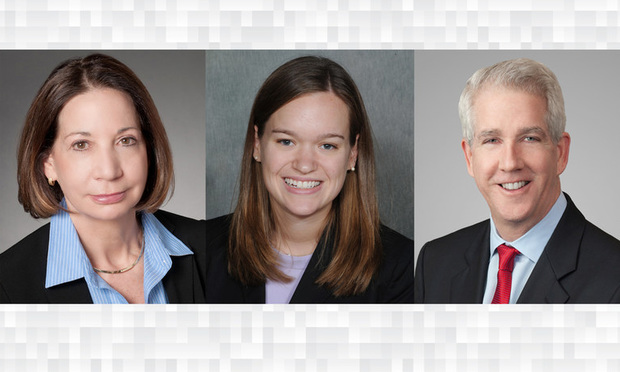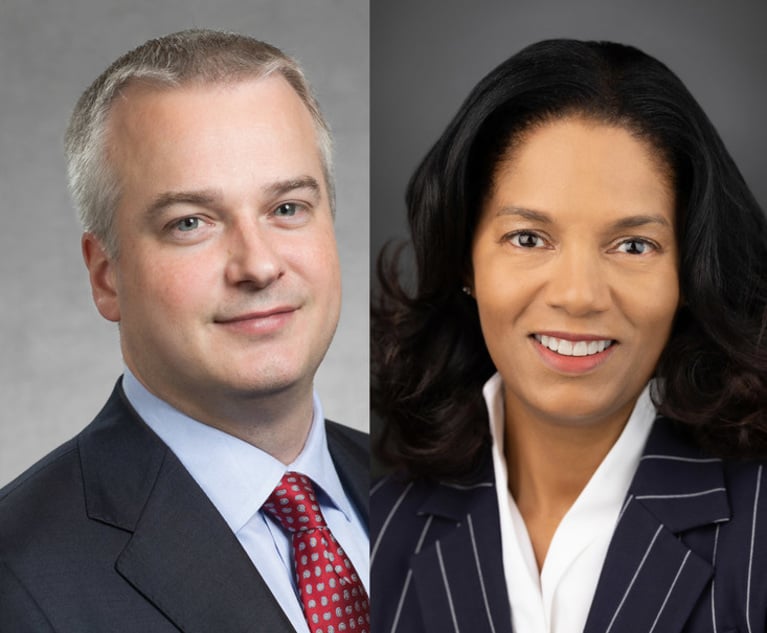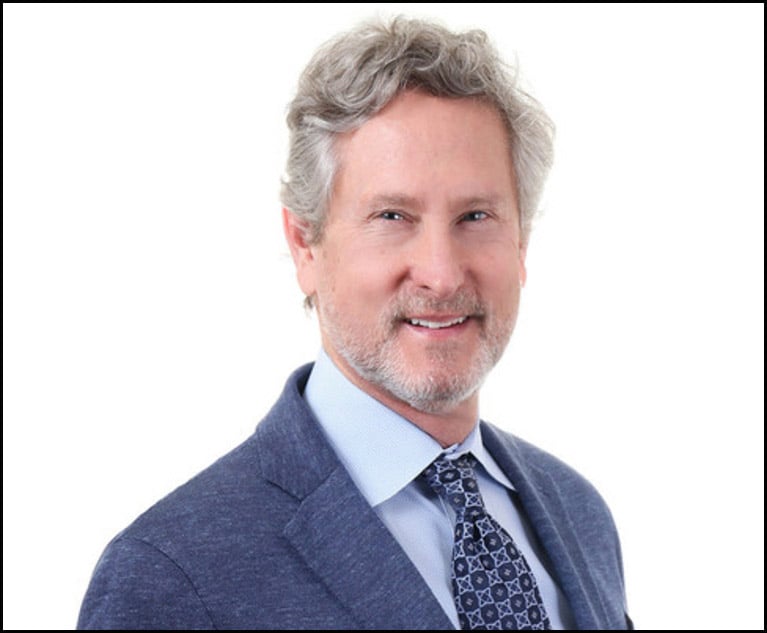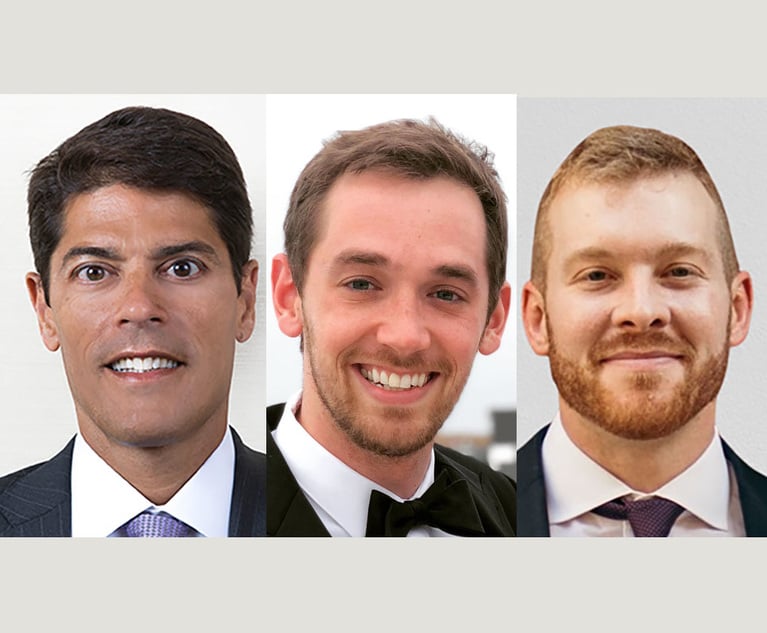Litigators of the Week: It's No Secret That Kirkland Trio Crushed This Case
More than big money was at stake. James Hurst, Patricia Carson and Diana Watral were determined to protect the "stellar reputations" of their clients, who were accused of being spies and cheats.
November 16, 2018 at 02:03 PM
9 minute read
 L-R: Patricia A. Carson, Diana M. Watral and James F. Hurst, of Kirkland & Ellis.
L-R: Patricia A. Carson, Diana M. Watral and James F. Hurst, of Kirkland & Ellis.
Our Litigators of the Week are Kirkland & Ellis partners Patricia Carson, Diana Watral and James Hurst,
Delaware-based biopharmaceutical research company Incyte Corp. sued Kirkland client Flexus Biosciences, originally seeking more than a billion dollars for allegedly stealing trade secrets. After an 11-day trial in Delaware state court, the jury sided with Flexus and awarded Incyte nothing.
The Kirkland team shared their thoughts on the win with Lit Daily.
Lit Daily: Who is your client and what was at stake?
Patricia Carson: Incyte originally asked for over billion dollars from our clients, a Silicon Valley company called Flexus Biosciences, which Bristol Myers acquired in 2015, and Flexus's two founders, Terry Rosen and Juan Jaen.
Although we slashed their case at the summary judgment stage, they still asked the jury for over $200 million, which could have been trebled to over $600 million.
But what was at stake was more than big money. It was about the stellar reputations of Terry and Juan, who even Incyte scientists called “visionaries,” and two other world-class scientists Incyte called a “spy” and a “sellout.” All four stood accused of stealing trade secrets, which as Jim told the jury in openings and closings is a “horrible accusation” in the world of science.
So it was personal. We wanted to vindicate Terry, Juan and the other two scientists.
Who was opposing counsel?
James Hurst: Two excellent trial lawyers split the opening and closing for Incyte, Steve Wood of McCarter & English and Stephen Ascher of Jenner & Block. They handled most of the examinations at trial too.
Tell us a little about the underlying technology they've been fighting over
Diana Watral: Both Incyte and Flexus had developed a new kind of cancer drug called an “IDO inhibitor,” which is basically designed to trigger your immune system to attack cancer cells as if they were foreign invaders.
How were you able to narrow the case at summary judgment?
Patricia Carson: We often joked that Incyte's trade secret claims were like a game of “whack-a-mole.” We'd refute one argument only to find two new arguments pop up in its place.
By the summary judgment stage, as the judge stated in her ruling, “[i]t is no longer time for just smoke. There has to be some fire.” For four of the six alleged trade secrets, the court ruled there was no fire.
Incyte had failed to raise an arguable issue of fact over whether the information was either actually a “secret” or was stolen by anybody. That left two alleged trade secrets to hopefully defeat at trial.
Incyte's lawyers in their opening statement called Flexus's founders “cheaters” and thieves, accused them of hiring “a spy and a sellout,” and said they did business “the wrong way.” Incyte's lawyers were also quoted in the local press as saying, “[I]t's a slammus dunkus case. We got 'em.” How did you handle the trash talk?
Diana Watral: Not that we needed any more motivation, but the “slammus dunkus” comment in the local press added at least some fuel to our collective desire to prove them wrong.
As to the other insults, we amplified them. We didn't think the jury would believe those over-the-top accusations. So we put a spotlight on them in both openings and closings.
In closings, for instance, we compared Incyte's in-court accusations about the four scientists being “liars,” “cheaters,” “thieves” and “blatantly dishonest” to what Incyte's witnesses said outside the courtroom, which included things like “visionaries,” “who you want on the front line trying to fight cancer,” “a source of inspiration” with an “insatiable passion to improve patients' lives” and “a person of high integrity” who was “held in high regard.”
What was the overarching theme or narrative of your case?
James Hurst: Sour grapes. Flexus came up with a much better drug than Incyte's. One of Incyte's own scientists called our drug “too good to be true.” So rather than admitting they got beat fair and square in the laboratory, Incyte resorted to claiming Flexus “must have cheated.”
Our narrative was helped greatly by an email Incyte's chief scientific officer sent saying they were filing suit to “explore” “potential” misappropriation during “discovery.” And we told the jury that's exactly what they did: Incyte “scoured our documents” for anything they could “claim” was a “trade secret,” and ultimately came up with only two “tiny specks in an ocean of research and experiments”—neither of which “was a secret, nor stolen, nor important.”
As the Delaware News Journal noted in its coverage of the trial, Incyte is “one of the state's most promising young companies,” employing about 700 people in Delaware who pull down an average salary of about $150,000. How did you counter Incyte's home court advantage?
James Hurst: We ignored it. Addressing the issue would have made it more likely for the jurors to focus on the idea of helping out a local company.
Patricia Carson: And to the extent that Incyte had any home court advantage, I think that was counter-balanced by the stellar reputations of the scientists who were accused of wrongdoing in the case. Terry, Juan and a third accused scientist all spoke directly and compellingly to the jury.
What were some of the highpoints at trial?
Patricia Carson: The greatest highpoint was definitely the verdict. But throughout the trial, the opportunity for the team to work with Terry and Juan, along with other truly world-class scientists from Flexus, gave a whole new dimension to preparing our case. Certainly it was the best scientific support I have ever seen for a technical trial team. And of course, working with Jim and Diana, who are both phenomenal, along with the rest of the trial team, made the two-week trial fly by.
James Hurst: I agree that the greatest highpoint was the verdict. The verdict for this trial was higher drama than usual, because the jury had asked a question earlier in deliberations that made us wonder if they were leaning for Incyte. But my nerves were completely calmed as the jurors walked into the courtroom to deliver their verdict, because one juror looked at me and smiled broadly. I figured that had to be a good sign.
Other highlights were watching Pat and Diana expertly extract key admissions when crossing Incyte's witnesses—damning admissions that became central anchors for the rest of our case and in closing arguments. It was truly a pleasure working with such exceptional trial lawyers and watching them work. In fact, the whole team worked great together to deliver for our clients.
Diana Watral: The highpoint for me was watching Jim cross-examine Incyte's chief scientific officer, who was a very polished witness during his direct examination. Jim drove home our theme that Incyte was just motivated by jealousy and dollar signs. My favorite part was when Jim used an email where the CSO compared himself to Derek Jeter and compared Terry to “some young wannabe shortstop at some no-name high school in Texas.” There is no good answer to that sort of email.
Any unconventional strategic choices?
Patricia Carson: Particularly in jury trials, law firms generally have only the most experienced trial lawyers examining witnesses. Kirkland & Ellis puts great emphasis on training associates to be trial lawyers, with its Kirkland Trial Advocacy program known as “KITA.”
Consistent with that, we had two associates, Ryan Moorman and Jason Feld, handle witnesses at trial. And they did an amazing job!
James Hurst: Yes, both Ryan and Jason were excellent. The court reporter thought so too, when telling me “the kids” did a great job.
Diana Watral: Incyte decided to play Terry's video deposition for the majority of his cross examination, instead of doing a lengthy live cross at trial. Jim convinced the judge to let us do Terry's direct exam right after that.
Terry was dynamic and passionate in court, which was a nice contrast to any video testimony. And it let us tell our story during Incyte's case-in-chief.
The jury found that all three defendants misappropriated one of Incyte's trade secrets. Or as a Delaware newspaper put it, “Incyte wins 'spying' case, but is awarded no damages.” What is your reaction to that characterization of the verdict?
James Hurst: That's not quite right, though I understand Incyte issued a press release to that effect
For the main alleged “trade secret,” which accounted for most of Incyte's damages request, the jury found that Incyte failed to prove it was even a trade secret, much less misappropriated.
For the other alleged “trade secret,” we told the jury in closings that a “no” for any of the three liability questions would mean they were delivering a verdict for and vindicating Juan, Terry and the other two accused scientists. That's exactly what the jury did. This was not a case where they found liability and wrote “zero” for damages. They found no liability, which was the right and fair outcome.
This content has been archived. It is available through our partners, LexisNexis® and Bloomberg Law.
To view this content, please continue to their sites.
Not a Lexis Subscriber?
Subscribe Now
Not a Bloomberg Law Subscriber?
Subscribe Now
NOT FOR REPRINT
© 2025 ALM Global, LLC, All Rights Reserved. Request academic re-use from www.copyright.com. All other uses, submit a request to [email protected]. For more information visit Asset & Logo Licensing.
You Might Like
View All
Litigators of the Week: A Trade Secret Win at the ITC for Viking Over Promising Potential Liver Drug

Litigation Leaders: Mark Jones of Nelson Mullins on Helping Clients Assemble ‘Dream Teams’

Litigators of the Week: Ingersoll Rand Enforces a Noncompete Against an Exec Who Jumped Ship to Verboten Competitor

Litigator of the Week: After Years Repping Prenatal Testing Client, First-Time First Chair Lands a $57M Patent Damages Verdict
Trending Stories
Who Got The Work
J. Brugh Lower of Gibbons has entered an appearance for industrial equipment supplier Devco Corporation in a pending trademark infringement lawsuit. The suit, accusing the defendant of selling knock-off Graco products, was filed Dec. 18 in New Jersey District Court by Rivkin Radler on behalf of Graco Inc. and Graco Minnesota. The case, assigned to U.S. District Judge Zahid N. Quraishi, is 3:24-cv-11294, Graco Inc. et al v. Devco Corporation.
Who Got The Work
Rebecca Maller-Stein and Kent A. Yalowitz of Arnold & Porter Kaye Scholer have entered their appearances for Hanaco Venture Capital and its executives, Lior Prosor and David Frankel, in a pending securities lawsuit. The action, filed on Dec. 24 in New York Southern District Court by Zell, Aron & Co. on behalf of Goldeneye Advisors, accuses the defendants of negligently and fraudulently managing the plaintiff's $1 million investment. The case, assigned to U.S. District Judge Vernon S. Broderick, is 1:24-cv-09918, Goldeneye Advisors, LLC v. Hanaco Venture Capital, Ltd. et al.
Who Got The Work
Attorneys from A&O Shearman has stepped in as defense counsel for Toronto-Dominion Bank and other defendants in a pending securities class action. The suit, filed Dec. 11 in New York Southern District Court by Bleichmar Fonti & Auld, accuses the defendants of concealing the bank's 'pervasive' deficiencies in regards to its compliance with the Bank Secrecy Act and the quality of its anti-money laundering controls. The case, assigned to U.S. District Judge Arun Subramanian, is 1:24-cv-09445, Gonzalez v. The Toronto-Dominion Bank et al.
Who Got The Work
Crown Castle International, a Pennsylvania company providing shared communications infrastructure, has turned to Luke D. Wolf of Gordon Rees Scully Mansukhani to fend off a pending breach-of-contract lawsuit. The court action, filed Nov. 25 in Michigan Eastern District Court by Hooper Hathaway PC on behalf of The Town Residences LLC, accuses Crown Castle of failing to transfer approximately $30,000 in utility payments from T-Mobile in breach of a roof-top lease and assignment agreement. The case, assigned to U.S. District Judge Susan K. Declercq, is 2:24-cv-13131, The Town Residences LLC v. T-Mobile US, Inc. et al.
Who Got The Work
Wilfred P. Coronato and Daniel M. Schwartz of McCarter & English have stepped in as defense counsel to Electrolux Home Products Inc. in a pending product liability lawsuit. The court action, filed Nov. 26 in New York Eastern District Court by Poulos Lopiccolo PC and Nagel Rice LLP on behalf of David Stern, alleges that the defendant's refrigerators’ drawers and shelving repeatedly break and fall apart within months after purchase. The case, assigned to U.S. District Judge Joan M. Azrack, is 2:24-cv-08204, Stern v. Electrolux Home Products, Inc.
Featured Firms
Law Offices of Gary Martin Hays & Associates, P.C.
(470) 294-1674
Law Offices of Mark E. Salomone
(857) 444-6468
Smith & Hassler
(713) 739-1250






